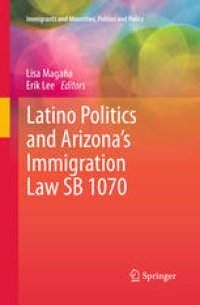
Ebook: Latino Politics and Arizona’s Immigration Law SB 1070
- Tags: Social Sciences general, Private International Law International & Foreign Law Comparative Law
- Series: Immigrants and Minorities Politics and Policy
- Year: 2013
- Publisher: Springer-Verlag New York
- Edition: 1
- Language: English
- pdf
Arizona has one of the fastest growing communities of Latino immigrants in the United States. In response to accusations that the Federal government was hampering the immigration enforcement actions of Arizona police, state Senator Russell Pearce introduced the “Support Our Law Enforcement and Safe Neighborhoods Act.” Better known as SB 1070, the policy allows police officers in Arizona to arrest unauthorized immigrants under the state’s trespassing law. The law also gives officers the latitude to question and detain those that may appear suspicious, which may simply mean that they appear Latino. Under the State’s statute, immigrants can also be criminalized for their mere presence in Arizona. The bill was signed into law on April 23, 2010, which generated a number of immensely complex issues at the local, national and international level The measure has affected an already problematic U.S.-Mexico, bi-national relationship at a time of increased security cooperation between the two countries. Furthermore, former the President of Mexico has criticized the law, issuing travel advisories, and as a sanction, trade between Arizona and Mexico has been reduced. Elected officials across the country called for a variety of economic boycotts and campaigns that would discourage the full implementation of the law. Over fifteen major cities have ended business contracts with Arizona. The State tourism industry has lost almost one billion dollars in less than six months as a result of this policy. This book examines a variety of issues and consequences of SB 1070 at the local, national and international level. It provides timely research and analysis on a topic not previously examined and from a variety of inter disciplinary approaches, making it of interest to political scientists and policy-makers alike.
Arizona has one of the fastest growing communities of Latino immigrants in the United States. In response to accusations that the Federal government was hampering the immigration enforcement actions of Arizona police, state Senator Russell Pearce introduced the “Support Our Law Enforcement and Safe Neighborhoods Act.” Better known as SB 1070, the policy allows police officers in Arizona to arrest unauthorized immigrants under the state’s trespassing law. The law also gives officers the latitude to question and detain those that may appear suspicious, which may simply mean that they appear Latino. Under the State’s statute, immigrants can also be criminalized for their mere presence in Arizona. The bill was signed into law on April 23, 2010, which generated a number of immensely complex issues at the local, national and international level The measure has affected an already problematic U.S.-Mexico, bi-national relationship at a time of increased security cooperation between the two countries. Furthermore, the former President of Mexico has criticized the law, issuing travel advisories, and as a sanction, trade between Arizona and Mexico has been reduced. Elected officials across the country called for a variety of economic boycotts and campaigns that would discourage the full implementation of the law. Over fifteen major cities have ended business contracts with Arizona. The State tourism industry has lost almost one billion dollars in less than six months as a result of this policy. This book examines a variety of issues and consequences of SB 1070 at the local, national and international level. It provides timely research and analysis on a topic not previously examined and from a variety of inter disciplinary approaches, making it of interest to political scientists and policy-makers alike.